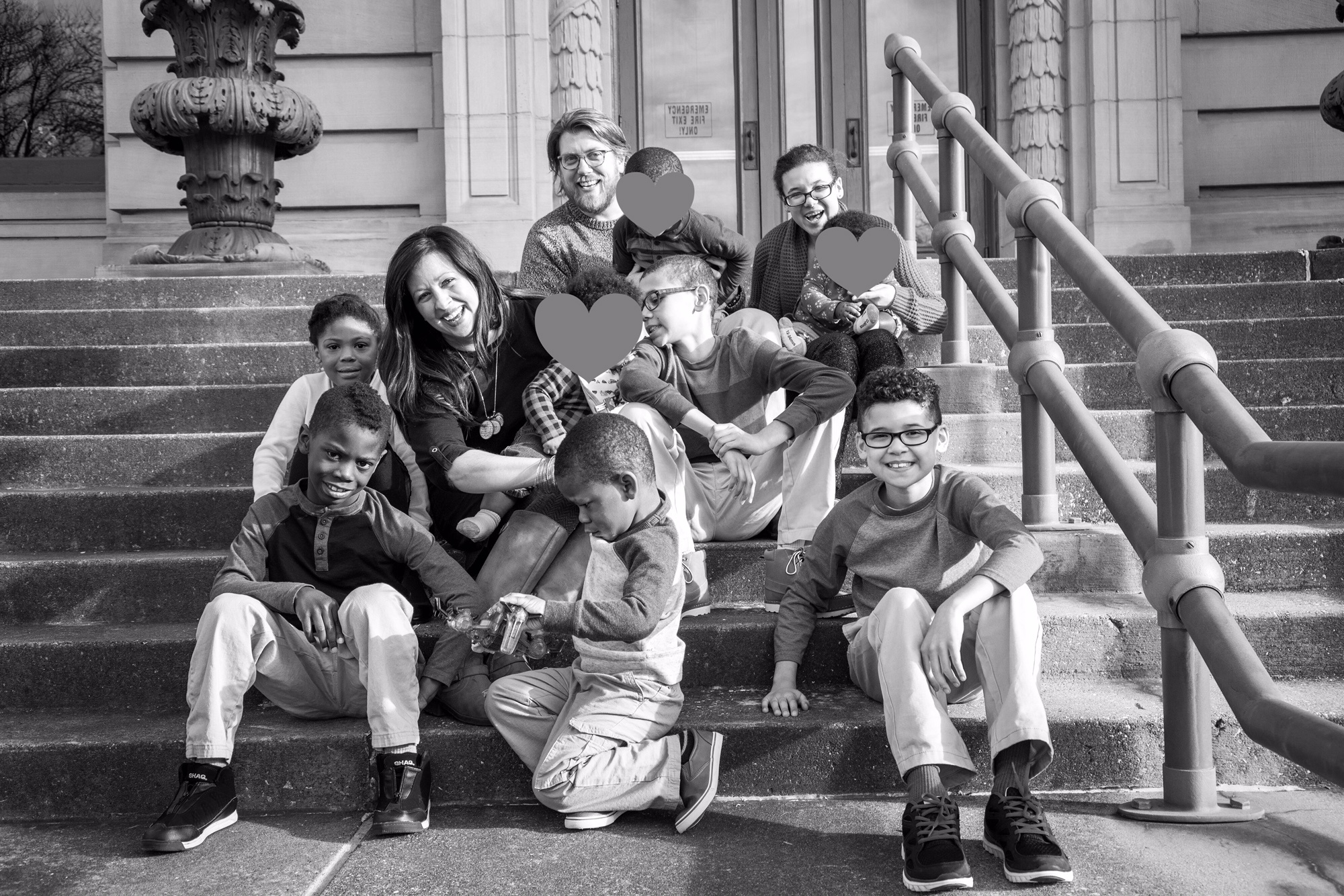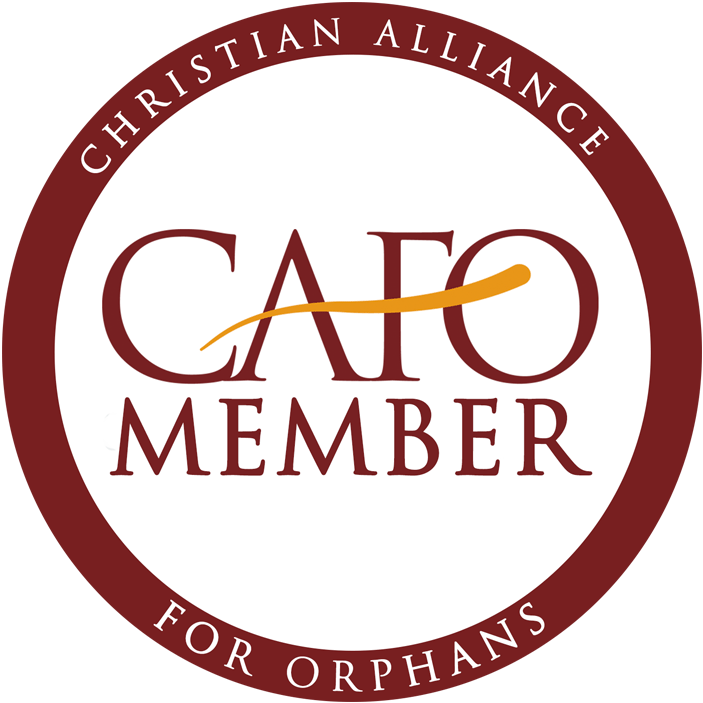
"I would rather have people ask about our family than avoid us. It’s easier to hear ‘I don’t know what to say’ than to have someone say nothing at all. We are always honored to share what God has done with our family."
Kirsten Smith believes her past experience prepared her for her present reality, although “nothing could fully prepare me to be the mother of nine!” She grew up with an idea of what foster care was, and after college she worked as a social worker with families in crisis, aiding in reunification, but also seeing the effects of child abuse and neglect. “It was a hard job,” she says. “I remember thinking, ‘I don’t know why God put me here.’” A few years later she realized that some of her own children came from those scenarios.
The adoption conversation
Kirsten and her husband, Josh, had always included the adoption option in their conversation about children, but they thought it would be later, after their biological children had been born. The diagnosis of “medically unexplained infertility” changed everything.
After about six months of trying to get pregnant, Kirsten started having problems and felt like something was “different.” After the generally accepted protocol of trying for a year with no result, they went to a fertility specialist who found that Kirsten had a blocked fallopian tube. Surgery would be required, but otherwise it was a simple fix.
They debated whether to do the surgery. “God revealed his sovereignty—we figured if Mary conceived Jesus without the normal physical procedure, God could certainly work around my physical barriers!” During the surgery, the doctor wanted to test to see if the blockage was cancerous, but the gas used in the surgical process blew the blockage out and there was nothing left to test. Still, after the surgery when everything was working properly, there was no pregnancy.
They surrendered their will to God’s and asked Him to show them his plan. Adoption was, as it always had been, an option, but Kirsten also remembered the need for foster parents from her time as a social worker.
Foster care
Both Kirsten and Josh had pictured starting their family with one child at a time. As they began their foster care journey, they found that keeping more than two siblings together was a challenge. Many times no foster homes were available to take more than one or two children at a time.
Because Kirsten had experienced the separation of siblings from the perspective of the social worker, she felt open to bringing in sibling groups. Josh took a few weeks longer to process the idea, but he felt that if she thought they could do it, he would trust her judgment.
They started with a sibling group of three—two boys and a girl—whom they adopted ten years ago. Their daughter eventually wanted a sister (“God was speaking to us through her desires,” says Kirsten.), so they became re-licensed and brought home their second set of three siblings, again two boys and a girl.
The birth mom of these children was expecting when the children came to Kirsten and Josh’s home, and they were willing to take him as a placement as well. He came at six weeks of age. The same birth mom later became pregnant with twins and asked if they’d also be willing to take them. Now they are the parents of nine! “God will make it clear,” says Kirsten about decisions regarding siblings groups—she knows this from experience.
Realities of multiples and many
When the Smiths added to their family after the original three had been adopted (“They felt like they had always been with us”), she wondered how adding more children would affect them. The younger children had more trauma in their background. But their older children were very willing to accept new siblings. “Jesus continually calls us to lay our lives down,” says Kirsten. Her children know what sacrificial love means.
The second set of siblings brought more chaos and difficulties because of their trauma background. When things would get tough and the thought of “how long do we have to do this” would arise, the constant answer was, “It’s not up to us. We’ll be here for them as long as they need.”
Day to day life with nine children in and of itself creates a slightly chaotic environment. “Everything is bigger and takes more time,” explains Kirsten, especially tasks such as cooking and laundry.
And then…cancer
Early in 2015, Kirsten began experiencing some health issues. She noticed a lump on the side of her neck, but had seven children at the time. Like many moms, unless something is really wrong, she let it slide. After several months, the lump not only didn’t go away, it got bigger.
She finally went to her primary care doctor, who was immediately concerned and sent her for testing. Very quickly she was diagnosed with thyroid cancer, which had spread into her lymph nodes. She had a thyroidectomy to remove the cancerous areas, then in January underwent radiation treatment.
Oddly enough, “it was almost easy to face the diagnosis of cancer because God had been so faithful in the other things,” Kirsten recalls. She even remembers joking about having cancer because it was the only way God could force her to get some rest.
At the time, Kirsten and Josh only shared information about the diagnosis with their oldest three children. It was very scary for the kids, and one of the first questions they asked was whether or not she would lose her hair. Thankfully, she didn’t have to have chemotherapy, so no hair loss. Because the youngest six children were still in the process of reunification, they didn’t have the space or the capacity to totally understand, so they didn’t share the medical information with them.
The practical side of having nine children
Having a large family means more of everything. How do things get done?
Laundry – “I don’t have an awesome system!” admits Kirsten. She does 2-3 loads a day. “I manage to get it in the washer and dryer during the day, but I usually can’t get it folded. So at night, when the kids are in bed, my husband and I dump it on our bed and chat while we fold.” The older children are able to put their clothes away, but the baskets for the youngest usually stay in Kirsten’s room where they come get clean clothes. (The important thing being that at least the clothes are clean!)
Grocery shopping – Thankfully, Josh handles most of the grocery shopping, sometimes taking a few of the kids with him. “We have a quad stroller, but it’s full of kids, so no room for groceries…and there’s no way I can handle a quad stroller and a grocery cart!” says Kirsten.
Meals – Again, Kirsten admits that she doesn’t have a perfect system. “We often piece things together,” like spaghetti or something simple. Some kids will eat certain items and other kids won’t. “I won’t make something completely different, but I’ll adjust the meal slightly so it’s something they will eat,” she says. Around 4 or 4:30 every day, she considers what is in the freezer or the fridge and they make it work. “I love the idea of having a plan, but it’s not possible at this point. Maybe when the babies are older!”
Chores – They currently don’t have assigned chores, but the older kids are “amazing, and will do pretty much anything we ask.” They mostly keep the dining room, family room and kitchen pretty picked up by straightening things 2-3 times a day, especially before bed. The kitchen is for Josh and Kirsten to do, although sometimes they put it off. “We clean as needed—again, I’d love to have a schedule, but maybe when everybody is in school that will work!” Kirsten points out that their house is clean, but not necessarily sanitized. The older kids help a lot, and it’s good for them to know they’re needed. “I tell them all the time ‘I could not do this without you guys!’”
Extracurricular activities – The current rule is that if the activity is happening through the school, they can do it. For other activities outside of school, they will likely have to wait until they are older. “I firmly believe that if God has gifted them with a special talent or ability, it’ll come out later.”
The most important thing is that the children are growing up together in a safe place.
How can the church help?
One major way friends helped the Smiths was to buy them a house! “Our friend felt the Lord telling him to buy us a house—we write him a check every month, but he considers it our house. The most amazing thing is that family is now in the process of getting licensed for foster care—that wasn’t even on their radar when they bought the house for us!”
Kirsten is appreciative of the fact that their children have been welcomed at church just like the other kids—“it hasn’t been an issue, even though our children are different races or bi-racial.” People have been helpful by dropping off meals or diapers, car seats, bouncy seats, swings—all kinds of baby equipment has just shown up through the generosity of people at their church.
Kirsten realizes that their family makes quite a show walking down the hall, and they all look different from each other. “I would rather have people ask about our family than avoid us,” she says. “It’s easier to hear ‘I don’t know what to say’ than to have someone say nothing at all. We are always honored to share what God has done with our family—it’s an amazing, amazing story.”
The TFI Story
Who Loves Series
Find a TFI Advocate Near You
Become a TFI Advocate
Hopefully, this episode has helped you right where you are on your foster care journey. That’s the goal. If you enjoyed it, will you tell others?
The best way to do that is to rate the podcast on Apple Podcasts and leave us a brief review! Your ratings and reviews help us get this podcast in front of new listeners. Your feedback also lets us know how we can better serve you. Thank you so much!

Meet Our Guest
Kirsten, a former child abuse/neglect social worker, and her husband, Josh, have been married for 15 years and are the parents of nine children—six of whom have been adopted through foster care, one who is in the process of being adopted, and two they hope to adopt. Their children’s ages are 15, 13, 12, 8, 6, 4, 2 and 13-month-old twins. Even as a mom to many, Kirsten finds time to share on her blog, liliesconsidered.com. The Smiths live in Ohio.
Get practical episodes and updates in your inbox.
Be the first to know about new episodes, posts, resources, and stay in the loop about what’s coming up.
Other Episodes You Might Enjoy:









